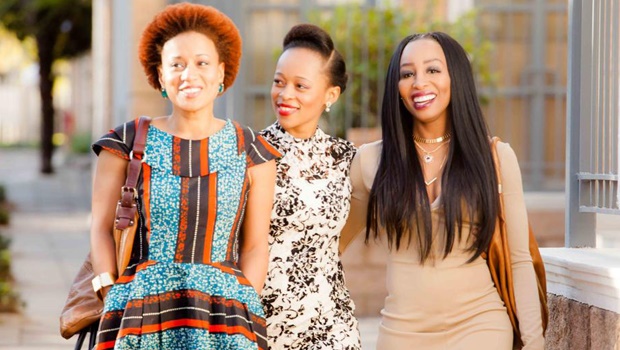
The film adaptation of Nozizwe Jele’s award-winning debut novel Happiness Is a Four-letter Word opens in cinemas around SA on Friday. Ahead of the premiere, Gugulethu Mhlungu chatted to the movie’s three leading ladies
I meet Khanyi Mbau, Mmabatho Montsho and Renate Stuurman, the stars of Happiness Is a Four-letter Word, on a cool Tuesday morning at 44 Stanley Avenue in Milpark.
They greet one another excitedly and, for a moment, it feels like I happen to be having coffee with three close friends, which – I realise as we chat – I actually am.
I ask if they’ve seen the movie and all three say “No!” and then laugh. “I guess they want [our reactions] to be natural,” quips Khanyi.
Mmabatho finishes her sentence: “So we are going to be as surprised as everyone else!”
“Look, at postproduction I kept trying to see what they are working on!” confesses Khanyi.
They laugh some more.
Renate says: “Doing the [postproduction] voice-over work helped because you get a sense [of the film], but I still don’t know. I am dying to know their [Khanyi and Mmabatho’s] storylines because we weren’t in all of each other’s scenes and we did our own audio dubbing. Also, you want to know what made it in and what didn’t because often the scene you think you nailed wasn’t the one...”
The other two “hmmm” in agreement.
For black women by black women
Based on Jele’s breakout novel, the film tells the story of Nandi (Mmabatho), Zaza (Khanyi) and Princess (Renate), who are trying to get ahead in their careers, and find love and happiness in the City of Gold.
The novel was awarded the 2011 Commonwealth Writers’ Prize for best first book, and the film prize at the 2011 M-Net Literary Awards, and has been republished in celebration of the film adaptation.
I ask why they chose to work on the film.
There’s a short silence, and Khanyi – talk show host, author and television actress – speaks first: “For me, it’s my first [cinema-release] film, so a big reason is growth of craft and getting into an entirely different space from just television and drama.”
Khanyi says the film’s director, Thabang Moleya, approached her. “I know Thabang from my ad days, and he approached me to audition for Zaza and asked me to read the script for her. It was very exciting. And also...” she clears her throat dramatically and then jokingly says: “Let’s just be real, bills must be paid!” We all laugh.
Renate says: “For me, I think it was really the idea of a South African book, our own book, being made into a film that is about three women who are similar to us ... They are not exactly like us, but we all know someone like them, and so there was something so familiar about the story – of friendship, of relationships and love and living in Johannesburg. Also, projects like these don’t come along often, so when they do, you want to be a part of it.”
Mmabatho says: “I have been behind the scenes for some time [as a producer], but I have always wanted to do a film, and this happened to be it. And it’s funny because Thabang mentioned it to me years ago, when they were looking at adapting the book for the big screen, and I had forgotten that this was the book that he mentioned all those years ago...
“We’ve also had other South African books adapted for the screen, but what was particularly special for me was that it was a novel by a black woman and the writing team was black women ... and that’s not common. You may get a head writer here and there, but to have a team writing a story for black women was refreshing.”
Friends like us
The beauty of Jele’s book, and by extension the movie, is how normal it is. It’s not tropey in the way South African black women’s stories are often treated. Mmabatho plays a big-shot lawyer, Khanyi plays a gorgeous wealthy housewife and Renate is the trendy art gallery owner. They’re all trying to make it and thrive in contemporary Jozi, which serves as the backdrop for the film, a character
in itself.
As different as all three lead roles are, they have a strong friendship, which keeps them together in the ups and downs of being young, black, beautiful and slaying in Jozi.
Khanyi says that she was initially worried that her character was too much like a younger version of herself.
“For me, it was like, oh geez, they are taking me back. Like seriously, I am really going to deal with this again?” she says in reference to her much-publicised relationship with businessman Theunis Crous.
She continues: “I thought to myself that maybe it was an opportunity to put the past behind me, and go through the lessons from that time one by one and see if we have really learnt them. For me, it was really initially ‘Argh, I’m being typecast!’ I was scared, but it was fun in the end.”
At this point, Mmabatho says to Khanyi: “What was nice was seeing you prepare for it. Because you could have just said, ‘Oh well I know this story, let me just fall in’, but it was deep. Headphones on set, quiet spaces, quiet corners. She didn’t take it for granted.”
For her part, Mmabatho says: “I actually auditioned for two roles, and then I bumped into Thabang at the gym and he asked, ‘Which part are you actually coming in for?’ and he suggested another. So it was a blind date with my character and, at face value, I may have thought that character was like me, but I soon realised that we are so different.”
Khanyi says: “I saw the hair and I knew [which role she was coming for]. You walked in and I was like ‘Come on with it!’”
They all laugh, and Renate says: “There was some familiarity because people tend to cast me as this friend, she has an Afro, she’s arty, independent and probably telling guys, ‘Just be quiet and go stand over there.’ So I have played similar women before with that attitude. There was something familiar about her because she does represent some part of my personality and that’s why she keeps coming back to me.”
I ask if they liked working with each other and they all chime: “Very much!”
Khanyi says: “It was more like going to coffee with friends every day. We would get into our own conversations about whatever else we were working on and about our lives, which was wonderful because it really felt like going to meet with friends more than just going to work.”
Mmabatho nods and adds: “The work was collaborative, there was no ego, we looked out for each other in terms of script and even aesthetically.”
Khanyi says: “It was a little daunting for me because I am raw talent and here I was working with seasoned actresses and it was like the first day of high school, but the older girls were really nice.”
Mmabatho and Renate are both amazed that she was nervous.
Love and the city
“I hope people who watch the movie see that we worked well together, we hung out and it was great,” sighs Khanyi.
Mmabatho agrees: “I also think women never hop on to a set and want to fight, because people want women to fight and be catty and so people set it up that way. We didn’t allow people to do that to us.”
And the guys in the film?
“They were visitors in our house. It was the girls’ territory. It was not about them,” Mmabatho says, joking. “They knew their place.”
Renate says: “I like the idea of including Johannesburg as a character. I hope ideas of the city are changing.”
Mmabatho agrees. “Just to go back to the guys, and the space, it was pan-African, especially in the urban spaces, the guys were from different parts of the continent, so you have a mix of people, which is how Joburg is. And it was an honest reflection of South Africa, which I think is rare in our TV and film. It is a mix of people living here and finding love and work.”
Renate agrees with Mmabatho and adds: “It also wasn’t a pointed thing. There was no big deal made of the different nationalities. It just was, because that’s how it is in life. We just are.”
A recent review of the film called it “Sex in the City but in Sandton”, and I ask the leading women if that is correct or if it typecasts the film. They disagree that it’s a typecast.
Khanyi says: “It’s giving it a vibe for you to understand the pace and energy that’s in the film. But it is what it is. You get the emotional scenes and it’s more your Waiting to Exhale when you have that close circle of friends. In terms of the fashion and the shoes we wear, you have your
The Devil Wears Prada and then you have Sex
and the City with the relationships and fast-paced urban life.”
Renate adds: “But also, you can’t compare a South African film to an American one because our budgets are almost nothing alike.”
Mmabatho says: “I remember when Sex and the City came out, it was about ‘these women who have sex and you must deal with it’. It was about sexual liberation, and was really about showing that women have and enjoy sex, with multiple people even. And that’s not the centre of this film. This movie is about what makes you happy. When you have your career, you are not worried about money, and you’ve actually got the guy but are you happy? Because at some point all the characters ask: ‘If this thing gets taken away from me, will I fall apart, will I be unhappy?’ So the question is around happiness when you have it all. The sex is there, but the question is about happiness.”
Happiness Is a Four-letter Word opens in cinemas on Friday, February 19 2016. You can follow the leading women on Twitter: Khanyi is @mbaureloaded, Renate is @renatestuurman and Mmabatho is @MmabathoMontsho




 Publications
Publications
 Partners
Partners








